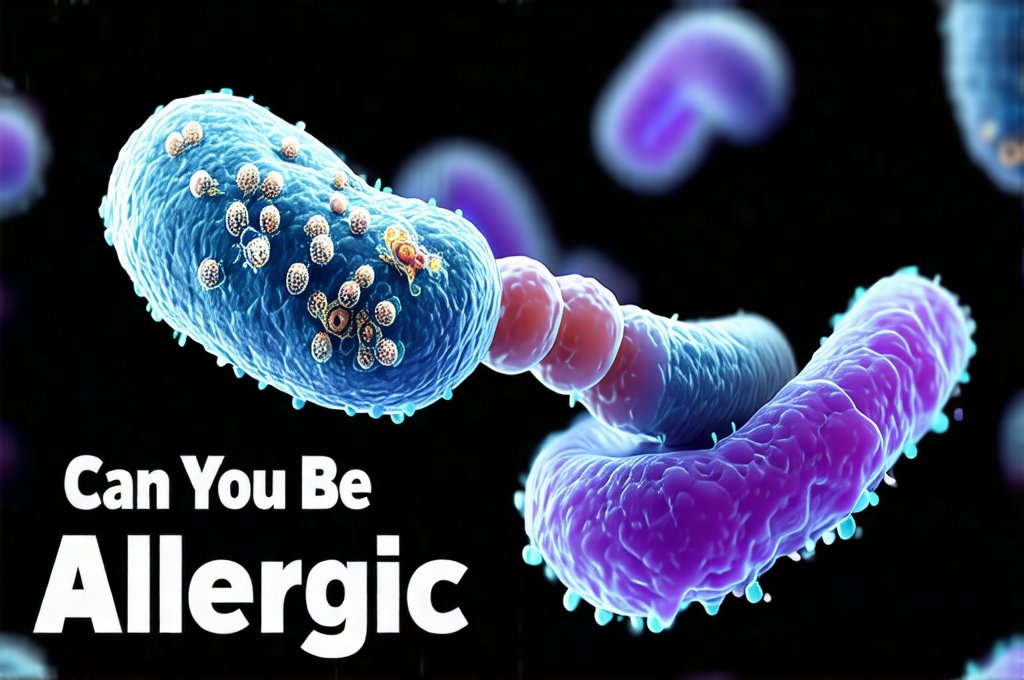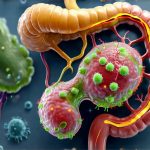Our understanding of the gut microbiome – the trillions of bacteria, fungi, viruses, and other microorganisms residing in our digestive tracts – has undergone a revolution in recent decades. What was once considered merely a collection of passive inhabitants is now recognized as an active and integral component of human health, influencing everything from digestion and immunity to mental wellbeing. This complex ecosystem isn’t static; it’s constantly interacting with us and responding to factors like diet, stress, and medication. Increasingly, researchers are investigating the potential for adverse reactions not necessarily to foreign invaders, but to elements within this very ecosystem we harbor – essentially, can our immune system misidentify parts of our own gut bacteria as threats?
This question delves into a fascinating area where immunology, microbiology, and gastroenterology converge. While true “allergy” in the classic sense (IgE-mediated hypersensitivity) might not be the primary mechanism at play, there’s growing evidence that dysbiosis – an imbalance in the gut microbiome – can trigger immune responses leading to various symptoms often mistaken for allergies or autoimmune conditions. These reactions are more likely related to immune activation and inflammation, driven by microbial metabolites, components like lipopolysaccharide (LPS), or even the bacteria themselves crossing the intestinal barrier under certain circumstances. This isn’t about a straightforward allergic reaction to Bacteroides fragilis, but rather the potential for a complex interplay between gut microbes, immune system function, and overall health. Considering whether you can be addicted to specific foods might also play a role in these imbalances https://vitagastro.com/can-you-be-addicted-to-trigger-foods/.
The Gut Microbiome & Immune System Crosstalk
The gut microbiome doesn’t simply exist in our bodies; it actively educates and modulates our immune system. From birth, exposure to microbial communities helps “train” the immune system to distinguish between harmless commensals (the bacteria that live peacefully alongside us) and truly pathogenic invaders. This process is critical for developing tolerance – preventing the immune system from overreacting to innocuous stimuli. Several key mechanisms underpin this crosstalk: – Barrier function: A healthy gut lining acts as a physical barrier, preventing bacterial translocation (leakage of bacteria or their components into the bloodstream). – Immune cell modulation: Gut microbes influence the development and activity of various immune cells, including T cells, B cells, and innate immune cells. – Metabolite production: Bacteria produce metabolites – small molecules like short-chain fatty acids (SCFAs) – that have profound effects on immune function and inflammation.
Dysbiosis disrupts this delicate balance. A shift in the microbial composition, often due to factors like antibiotic use, poor diet, or chronic stress, can lead to a weakened barrier, altered metabolite production, and an overstimulated immune system. When harmful bacteria proliferate or beneficial bacteria decline, it increases the likelihood of triggering inappropriate immune responses. This doesn’t necessarily mean a classic allergic reaction with histamine release; instead, it often manifests as chronic low-grade inflammation, which is implicated in many chronic diseases. The immune response can target microbial components, but also potentially cross-react with self-antigens (molecules from our own tissues), contributing to autoimmune phenomena. It’s worth exploring gut reactions and potential mineral deficiencies https://vitagastro.com/can-gut-reactions-be-linked-to-mineral-deficiency/ if you suspect a connection.
Furthermore, the concept of “leaky gut” – increased intestinal permeability – plays a significant role. A compromised barrier allows more bacterial products like LPS to enter the bloodstream, activating immune cells and triggering inflammation. This ongoing activation can lead to systemic symptoms and contribute to conditions like irritable bowel syndrome (IBS), food sensitivities, and even autoimmune diseases. It’s important to note that “leaky gut” is a complex issue often oversimplified; it’s not always a structural defect but more frequently a functional impairment related to inflammation and dysbiosis.
Potential Mechanisms of Microbial-Driven Immune Activation
While a classic IgE-mediated allergy to gut bacteria is rare, several mechanisms can explain how the microbiome might trigger immune activation and symptoms:
-
Molecular Mimicry: Some bacterial components share structural similarities with human proteins. This can lead to cross-reactivity, where antibodies or T cells generated against the bacterial component mistakenly target self-proteins, initiating an autoimmune response. For example, certain strains of bacteria may have surface molecules resembling those found in joint tissues, potentially contributing to rheumatoid arthritis.
-
Inflammasome Activation: The inflammasome is a multi-protein complex within immune cells that activates when it detects danger signals, such as microbial components like LPS or flagellin (a protein on bacterial surfaces). This activation leads to the release of pro-inflammatory cytokines, driving inflammation and potentially contributing to chronic disease. Certain gut bacteria are more potent activators of inflammasomes than others.
-
Metabolite-Induced Immune Modulation: Gut bacteria produce a wide range of metabolites that can influence immune function. While some metabolites like SCFAs have anti-inflammatory effects, others can promote inflammation or disrupt immune cell development. For instance, imbalances in tryptophan metabolism by gut bacteria can generate compounds that exacerbate inflammatory responses.
The interplay between these mechanisms is complex and varies from person to person, depending on their individual microbiome composition, genetic predisposition, and environmental factors. Understanding these pathways is crucial for developing targeted therapies aimed at modulating the gut microbiome and restoring immune homeostasis. It’s also essential to remember that these aren’t necessarily reactions against the bacteria themselves, but responses to signals they produce or components they release. Gut bacteria imbalance can significantly influence this process https://vitagastro.com/signs-your-reflux-might-be-linked-to-gut-bacteria-imbalance/.
The Role of Microbial Metabolites in Immune Response
Microbial metabolites are often overlooked in discussions about gut health, yet they play a pivotal role in shaping immune function. Short-chain fatty acids (SCFAs) – acetate, propionate, and butyrate – are among the most well-studied microbial metabolites. Produced by bacterial fermentation of dietary fiber, SCFAs have numerous beneficial effects, including: – Strengthening the gut barrier: Butyrate is a primary energy source for colonocytes (cells lining the colon), promoting their health and function. – Reducing inflammation: SCFAs can suppress pro-inflammatory cytokine production and enhance regulatory T cell development – cells that help dampen down immune responses. – Modulating immune cell activity: SCFAs influence the differentiation and function of various immune cells, contributing to a balanced immune response.
However, imbalances in microbial metabolism can also generate harmful metabolites. For example, trimethylamine N-oxide (TMAO), produced from choline by gut bacteria, has been linked to increased cardiovascular risk. Similarly, hydrogen sulfide (H2S) – generated by some bacteria during protein fermentation – can be pro-inflammatory in high concentrations. The types of metabolites produced depend heavily on the composition of the microbiome and dietary habits. A diet rich in fiber promotes SCFA production, while a diet high in processed foods and animal products can favor the generation of harmful metabolites.
Furthermore, emerging research suggests that specific microbial communities can influence tryptophan metabolism, producing compounds like indole derivatives that modulate immune function. These indole derivatives can act as signaling molecules, influencing gut motility, barrier integrity, and immune cell activity. Understanding how different microbial metabolites affect immune responses is critical for developing strategies to optimize gut health and prevent disease. Cooking methods can impact metabolite production https://vitagastro.com/can-you-be-sensitive-to-cooking-methods/.
Identifying & Addressing Potential Microbial Sensitivities
Currently, there’s no single diagnostic test to definitively determine if someone is “allergic” to their own gut bacteria in the traditional sense. However, several approaches can help identify potential microbial imbalances and associated immune activation: – Comprehensive Stool Analysis: These tests assess the composition of the microbiome, identifying both beneficial and potentially harmful bacterial species. – Food Sensitivity Testing: While not directly measuring reactions to gut bacteria, food sensitivity testing can sometimes reveal correlations between dietary triggers and symptoms, which may be linked to microbial dysbiosis. – Inflammation Markers: Blood tests can measure markers of inflammation (e.g., C-reactive protein, fecal calprotectin) to assess the overall level of immune activation. – Symptom Tracking: Carefully tracking symptoms in relation to diet and lifestyle factors can provide valuable clues about potential triggers.
Addressing microbial sensitivities often involves a multi-faceted approach: 1. Dietary Modifications: Focusing on a whole-food, plant-rich diet that promotes SCFA production and reduces inflammation. Reducing processed foods, sugar, and excessive animal protein is crucial. 2. Probiotic Supplementation: Introducing beneficial bacteria to help restore microbial balance. However, the choice of probiotic should be tailored to individual needs and based on scientific evidence. 3. Prebiotic Foods: Consuming prebiotic fibers – found in foods like onions, garlic, leeks, and asparagus – provides fuel for beneficial bacteria. 4. Stress Management: Chronic stress can disrupt the gut microbiome; incorporating stress-reducing techniques like mindfulness or yoga is important.
It’s vital to work with a healthcare professional experienced in functional medicine or gastroenterology to develop a personalized plan. Self-treating without proper guidance can be detrimental, and it’s essential to rule out other potential causes of symptoms before attributing them solely to microbial imbalances. The field of gut microbiome research is rapidly evolving, and our understanding of these complex interactions will continue to improve over time. Consider if food texture plays a role in your sensitivities https://vitagastro.com/can-you-be-sensitive-to-food-texture/. And explore whether you might be sensitive to spices, despite no other food issues https://vitagastro.com/can-you-be-sensitive-to-spices-but-not-food/. Finally, think about if mineral deficiency could be contributing to your gut reactions https://vitagastro.com/can-gut-reactions-be-linked-to-mineral-deficiency/.


















